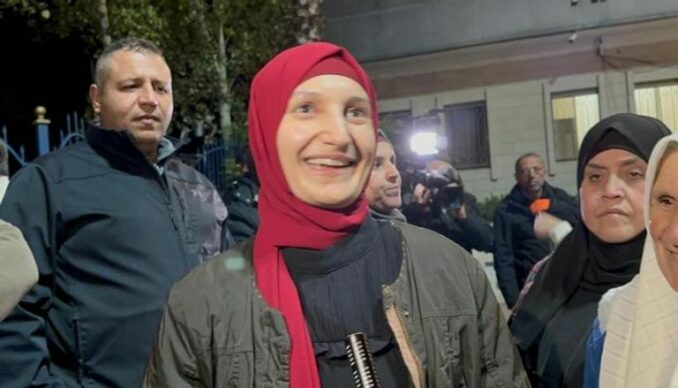Palestinian struggle reflects strength and solidarity of women
WW commentary
Nov. 25 marks the International Day for the Elimination of Violence against Women, proclaimed by the United Nations in 2000. And this year the U.N. is launching a “UNITE” campaign which will include 16 days of activism starting on Nov. 25 and ending on Dec. 10, International Human Rights Day.

Maysoon Al-Jabali
What the U.N. is projecting and what these 16 days will look like is anyone’s guess. It’s doubtful that whatever activities the U.N. campaign organizes will make any real difference in the lives of women and girls, regardless of their age, gender identity or sexuality. The U.N. has proven itself to be a non-democratic body where any votes taken by the 193 members of the General Assembly can be overridden by the 15-member Security Council, with its five permanent members, including the United States, which can veto any decision.
There is no other world development today that more clearly highlights the need for the elimination of violence against women than what is happening in occupied Palestine, especially Gaza. Ever since the events of Oct. 7 — truthfully since Israel was established in 1948 — Palestinian women along with children have borne the brunt of a genocidal war by the terrorist Zionist state of Israel.
According to the Government Media office on the Resistance News Network, over 20,000 Palestinian civilians have been slaughtered since Oct. 7, including over 4,000 women and 8,000 children. And there are more than 7,000 unaccounted for due to being buried under the rubble of bombed residential buildings, homes and other structures. These horrendous numbers do not include those murdered by the Israeli Occupation Forces in the occupied West Bank.
Since Nov. 24, when the temporary truce went into effect between the Palestinian resistance and Israel, many Palestinian prisoners released or scheduled to be released are women. Many of them were detained as teenagers and spent years in prison for the “crime” of being Palestinian.
They experienced beatings, physical and mental torture, sexual violence, lack of healthy food and hygiene and much more. These heroic women include Fadwa Hamada, Israa Ja’abis, Nourhan Awad, Shorouq Diwayat, Maysoon Al-Jabali, Aisha Al-Afghani, Shorouq Salan Ibrahim, Yasmeen Taysir, Abdulrah Shaaban, Nufuz Jad Aref Hammad and Itaf Yusuf Muhammad.
Al-Jabali, who was imprisoned for over eight years, states, “Resistance must continue, all forms of resistance. Of course, there will be a cost. We will be imprisoned and martyred on the path to liberation.
“As women prisoners, we always confront the prison administration. Our spirits are high and always return high even if we break. The occupation is happy when we are sad, so despite everything, we rejoice and stay strong.
“We want to thank all those who worked for the deal: the resistance, the Gazan people, all the Palestinian fighters and all the foreigners who protested and opposed their governments’ positions, especially those who defended the resistance.
“There is no occupation that lasts. ‘Israel’ will fall, and we will return as one people.” (Resistance News Network Prisoners, Nov. 27)
Solidarity: another form of resistance
This particular phase of the Palestinian resistance has inspired an unprecedented level of global solidarity in the Global South and Global North. Massive protests have brought out millions of people into the streets. In the U.S., thousands have participated in protests at the White House, in malls during Black Friday, on college campuses and at high schools and more.
Every sector in U.S. society has been impacted to one degree or another by the genocide in Gaza. This includes the film industry.

Melissa Barrera
While a growing number of celebrities have called for a cease-fire, two women actors took high-profile stances, actually putting their careers on the line. Those women are the well-established Oscar winner Susan Sarandon and a relative newcomer, Melissa Barrera.
Barrera, who is Mexicana, was recently fired from her leading role by producers of the popular franchise horror movie series “Scream” for expressing her sympathy for the people of Gaza facing genocide. Her remarks were labeled “antisemitic.”
In her Nov. 21 Instagram post, Barrera wrote, “Gaza is currently being treated like a concentration camp. … Cornering everyone together, with nowhere to go, no electricity, no water … People have learnt nothing from our histories. And just like our histories, people are still silently watching it all happen. THIS IS GENOCIDE AND ETHNIC CLEANSING.”
Sarandon, who has a history of opposing imperialist wars and other forms of injustice for decades, was let go by United Talent Agency for outspoken pro-Palestinian remarks. She spoke at the 300,000-strong Free Palestine demonstration in Washington, D.C., on Nov. 4.
On X (formerly Twitter) Sarandon stated: “You don’t have to be Palestinian to care about what’s happening in Gaza. I stand with Palestine. No one is free until everyone is free.”
Whether on the front lines of a liberation struggle like the women of Palestine or expressing unwavering solidarity with Palestinian people as Barrera and Sarandon have done, an International Day for the Elimination of Violence against Women should not be limited to just one day but should be a priority every single day.
Days of solidarity like Nov. 25 and Dec. 10 can be used by the world movement to help to move the class struggle forward in the interests of women and gender-oppressed people, an integral sector of the working class and oppressed peoples, until there is total liberation from the scourge of capitalism and imperialism.

